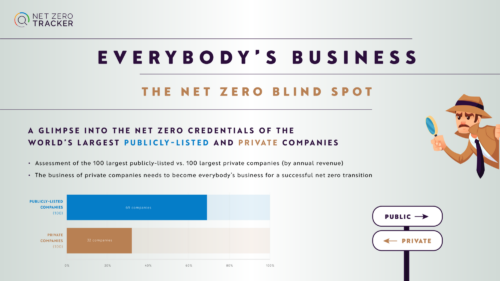Everybody's Business: The net zero blind spot
Publicly-listed companies are committing to net zero, but privately-held firms are largely not.
Last updated:
In recent years the emission-cutting plans of major publicly-listed companies have received an increasing amount of attention. Much of this focuses on companies’ targets for net zero emissions, which is now the dominant framing that many entities, corporate and public sector, use for decarbonisation pledges and plans.
By comparison, the plans of major private companies receive very little attention. But private companies, accountable only to their owners, and with less regulatory scrutiny and oversight, make up a large share of the world economy: the aggregate annual revenue of the 100 largest private companies in the world amounts to over $4 trillion, almost 5% of the global economy.
In this report, we pull back the curtain on the world’s biggest private companies and ask how their pledges and plans for net zero compare to their publicly-listed counterparts. The comparison includes both the existence and robustness of a net zero target: for example, whether the company has:
- set interim targets
- published a plan outlining how it will reach net zero
- committed to report its progress annually
- is clear about the scopes of emissions contained in its target, and planned use of offsets.
Data on the world’s biggest 100 publicly-listed companies was drawn from the Net Zero Tracker database. We then used a list of the biggest 100 private companies and applied the same criteria to their targets, where they exist, that we use in the Tracker.
On almost all net zero quantity and quality metrics we investigated, we find that private companies are trailing their public counterparts.
Less than half as many have set net zero targets (32 of the top 100 private firms compared with 69 of the top 100 publicly-listed companies). Of those that have set a net zero target, only 13% (4) have published a plan to reach it, versus 73% (50) of their publicly-listed counterparts. The private companies that have set a net zero target are less likely to include Scope 3 emissions within it, are less likely to have set interim targets, and give less clarity on their planned use of offsets.
The situation is even more concerning when considered in the context of other findings by the Net Zero Tracker and others showing that overall, while corporate target-setting continues at speed, the targets of publicly-listed companies themselves show insufficient rigour and integrity. Considered collectively, the net zero performance of major private companies in this report is seriously deficient compared against a benchmark that is itself full of shortcomings.
In short, the lack of integrity of the largest private firms’ net zero pledges is a $4.3 trillion blind spot that is likely to gain much greater interest in the coming years. Constituencies that take an active interest in the decarbonisation plans of publicly-listed companies are likely to bring more scrutiny to bear on their privately-held counterparts.
The value of this Net Zero Tracker analysis lies in providing a glimpse into the dimly-lit world of private firms, and in presenting a baseline for future analysis — by ourselves or others — to compare against it. We also hope it supports efforts to grow awareness across academia, civil society and policymaking centres that we need more than just transparency to address the stark net zero disparities that exist between publicly-listed and privately-held companies.
Acknowledgements
This analysis was led by John Lang, who wrote the report with Richard Black. Substantive contributions were made by Lyndsey Fowks, Takeshi Kuramochi, Camilla Hyslop, Tom Hale, Nick Hay, Zhi Yi Yeo, Frederic Hans, Peter Chalkley, Steve Smith and Angel Hsu.
The private and publicly-listed firm data collection was led by Camilla Hyslop and Lyndsey Fowks.
Reference
Everybody's Business: The Net Zero Blind Spot, Net Zero Tracker. Energy and Climate Intelligence Unit, Data-Driven EnviroLab, NewClimate Institute, Oxford Net Zero. October, 2022.
